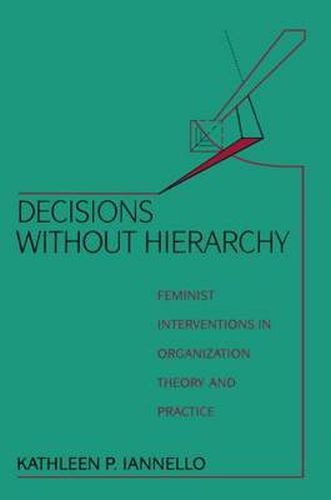Readings Newsletter
Become a Readings Member to make your shopping experience even easier.
Sign in or sign up for free!
You’re not far away from qualifying for FREE standard shipping within Australia
You’ve qualified for FREE standard shipping within Australia
The cart is loading…






Bringing feminist and organization theory together with feminist organizational practice, Kathleen Iannello provides an insightful analysis that both illustrates and explains the successes and challenges facing non-hierarchical organizations. As Iannello makes clear, feminist theory offers a powerful tool for thinking about and constructing new organizational forms. Decisions Without Hierarchy is based on a two-year examination of three feminist organizations: a peace group, health collective, and business women’s group. From these case studies, Iannello constructs a model of organizations that, while structured, is nevertheless non-hierarchical. She terms this organization from the modified consensus model. Her case studies show that modified consensus does not give way to pressures toward formal hierarchy and that, therefore, the model merits the attention of feminists and organization theorists alike.
$9.00 standard shipping within Australia
FREE standard shipping within Australia for orders over $100.00
Express & International shipping calculated at checkout
Bringing feminist and organization theory together with feminist organizational practice, Kathleen Iannello provides an insightful analysis that both illustrates and explains the successes and challenges facing non-hierarchical organizations. As Iannello makes clear, feminist theory offers a powerful tool for thinking about and constructing new organizational forms. Decisions Without Hierarchy is based on a two-year examination of three feminist organizations: a peace group, health collective, and business women’s group. From these case studies, Iannello constructs a model of organizations that, while structured, is nevertheless non-hierarchical. She terms this organization from the modified consensus model. Her case studies show that modified consensus does not give way to pressures toward formal hierarchy and that, therefore, the model merits the attention of feminists and organization theorists alike.